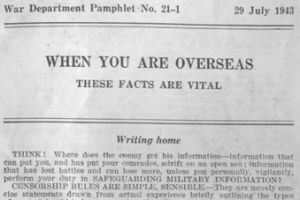 In his last two letters, Babe makes note of the care the military took in World War II to protect military information. Soldiers in the army were apparently trained about what they could and couldn’t say in their letters home. As a result, Babe notes, they’re not as interesting as he would like his letters to be.
In his last two letters, Babe makes note of the care the military took in World War II to protect military information. Soldiers in the army were apparently trained about what they could and couldn’t say in their letters home. As a result, Babe notes, they’re not as interesting as he would like his letters to be.
“Do you think I can tell you everything that goes on down here?” Babe asks his brother Vin in the last letter. “There are a lot of things I’d like to tell you, but I just can’t. Every day we get an army circular issued by the War Department read to us on preserving military information.”
He tells his parents in the previous letter, “A couple of days ago, we were given another lecture on safeguarding military information. They tell us not to tell you anything that would be of any value to any spies.”
One of those army circulars might have been War Department Pamphlet No. 21‑1 (although Babe himself would not have seen that one just yet. It was issued July 29, 1943, several months after that letter was written to Vin).
In War Department Pamphlet No. 21‑1, soldiers, sailors, marines and airmen are warned:
THINK! Where does the enemy get his information — information that can put you, and has put your comrades, adrift on an open sea; information that has lost battles and can lose more, unless you personally, vigilantly, perform your duty in SAFEGUARDING MILITARY INFORMATION?
The circular goes on to detail 10 “don’ts” that service members should remember when they write their letters (it also goes on in excruciating detail about how to address a letter).
During WWII, letters that enlisted men wrote were censored. Several of Babe’s later letters will be censored, indicated by a scribble on the envelope that indicates it was. A PBS documentary called “War Letters” cited Myron Fox, past vice president of the Military Postal History Society, to explain how letters from military personnel were censored.
The enlisted soldier was censored by an officer in his unit. It was considered an unimportant job and often someone like the chaplain or the dentist would get saddled with the job. If the enlisted man did not want his officer to read his mail — if he had been giving him a hard time, let’s say — the soldier could use what was called a ‘blue envelope.’ The writer would certify that there is nothing in here that shouldn’t be and the letter would go up to the next level where it might be looked at a little more kindly.
Fox said the military probably felt that level of control over the mail wasn’t worth the enormous effort after World War II, noting too that the pace of communication increased rapidly after that period. One military website includes a “frequently asked questions” section that asks that question specifically. Will mail be censored? The answer: “The (Department of Defense) does not, nor have any plans to censor mail. Current laws protect the privacy of mail once it is placed within the postal system. Custom officials under customs laws may open packages.”
One thought on “Censorship and Protecting Military Information in Letters Home”